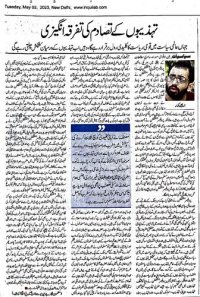
Ebook: 30 Years Later: Revisiting the Divisiveness of the Discourse of the clash of Civilizations
Author: Abhay Kumar
- Genre: Other Social Sciences // Cultural
- Tags: West Western Civilization Islam Muslim World Arab World Cold War Post-Cold War Foreign Policy Islam Christianity
- Year: 2023
- Publisher: Inquilab
- City: New Delhi
- Language: English
- pdf
Thirty years back, the prediction was made that the sources of global political conflict would be "cultural". Unlike in the past when nation-states fought with each other and the ideology-based conflict during the Cold War, the post-Cold War world would see the fight among one group of nation-states of a particular civilisation fighting against another group of nation-states belonging to a rival civilisation. It was also argued that religious consciousness was increasing worldwide and the fault line in the new century would be cultural.
Professor Samuel P Huntington gave such a hypothesis in his widely-cited article, published in “Foreign Affairs” in 1993.
However, the historical reality proves that such a hypothesis of cultural conflicts was not the best analysis of the post-Cold War world. Such a discourse failed to capture the much bigger reality of economic inequality rising across the world. Instead, it tried to create a cultural polarisation in world politics and intensify prejudice against Muslims.
Another major weakness of such an argument was the exclusive focus on culture, to the exclusion of other factors such as economic disparity, gender inequality and environmental crisis.
30 years later, Dr Abhay Kumar revisits Professor Huntington’s thesis and argues that cultural cooperation between Western/Christian civilisation and Islamic civilisation is a far bigger reality than the conflict-hypothesis between them. For example, the teachings of Christianity and Islam are almost the same. Muslims, like Christians, pay great respect to Jesus Christ and consider Jesus Christa as Prophet.
Moreover, Muslims pay their gratitude to the Christian ruler of Africa, who gave shelter to a group of Arab Muslims who fled to him to avoid persecution during the days of Prophet Mohammad.
History is witness to numerous incidents of cooperation between Christians and Muslims, as the cases of conflicts between them were fewer. Even though the conflicts occurred, they were the result of political fights between rulers. The political fights did not happen among Muslims and Christians but they were also recorded among Muslims and Christians. Many people would argue that the clash-within and internal conflicts are perhaps bigger reality than the bogey of external threat.
For more read Abhay Kumar’s article in Inquilab, May 2, 2023.
(Source: Abhay Kumar, 'Tahzeebon ke tasadum ki Tafriqa Angezi', The Inquilab, New Delhi, May 2, 2023)
Professor Samuel P Huntington gave such a hypothesis in his widely-cited article, published in “Foreign Affairs” in 1993.
However, the historical reality proves that such a hypothesis of cultural conflicts was not the best analysis of the post-Cold War world. Such a discourse failed to capture the much bigger reality of economic inequality rising across the world. Instead, it tried to create a cultural polarisation in world politics and intensify prejudice against Muslims.
Another major weakness of such an argument was the exclusive focus on culture, to the exclusion of other factors such as economic disparity, gender inequality and environmental crisis.
30 years later, Dr Abhay Kumar revisits Professor Huntington’s thesis and argues that cultural cooperation between Western/Christian civilisation and Islamic civilisation is a far bigger reality than the conflict-hypothesis between them. For example, the teachings of Christianity and Islam are almost the same. Muslims, like Christians, pay great respect to Jesus Christ and consider Jesus Christa as Prophet.
Moreover, Muslims pay their gratitude to the Christian ruler of Africa, who gave shelter to a group of Arab Muslims who fled to him to avoid persecution during the days of Prophet Mohammad.
History is witness to numerous incidents of cooperation between Christians and Muslims, as the cases of conflicts between them were fewer. Even though the conflicts occurred, they were the result of political fights between rulers. The political fights did not happen among Muslims and Christians but they were also recorded among Muslims and Christians. Many people would argue that the clash-within and internal conflicts are perhaps bigger reality than the bogey of external threat.
For more read Abhay Kumar’s article in Inquilab, May 2, 2023.
(Source: Abhay Kumar, 'Tahzeebon ke tasadum ki Tafriqa Angezi', The Inquilab, New Delhi, May 2, 2023)
Download the book 30 Years Later: Revisiting the Divisiveness of the Discourse of the clash of Civilizations for free or read online
Continue reading on any device:

Last viewed books
Related books
{related-news}
Comments (0)